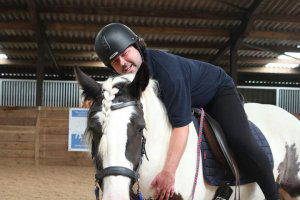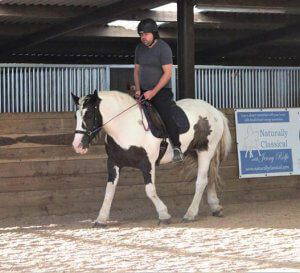
Charlie Avent has been inspiring people all over the world with his touching story, about how he deals with the challenges that being autistic brings.
Autism is a lifelong, developmental disability that affects how a person communicates with and relates to other people, and how they experience the world around them. Autistic people see, hear and feel the world differently to other people. If you are autistic, you are autistic for life; autism is not an illness or disease and cannot be ‘cured’. With the right sort of support, all autistic people can be helped to live a more fulfilling life of their own choosing.
Charlie knew he was different from a young age and school was a troubling time. Much less was known about Autism and it’s effects on people and Charlie’s peers were cruel.
Things became so severe, that Charlie couldn’t see a way forward and lost the will to go on. He began to contemplate and plan his suicide. Horses have helped Charlie to see the way forward and he has a mission: To change the way that people with disabilities treat themselves, and how others treat people with disabilities.
Oscar was the catalyst that changed the way that Charlie looked at life. He was a bay Thoroughbred who spoke Charlie’s language and became his guide, leading him forward through those darker times. Things have improved and Charlie is able to look back at those times now and see that things have improved. He now has Auntie, to look after him. Together they have lots of fun, and hope to gain enough funding to produce a documentary all about Autism, how it affects Charlie everyday and how horses can help Autistic people.

Many autistic people are seen to benefit from spending time with animals as well as horses. Theories suggest that this is likely to be linked with the strong desire to maintain a familiar routine- of which is often used in the management of horses and other animals. Horses are known to prefer the same routine, the same stable, the same path or route, and the same habits, similar to people with autism. More importantly, horses are content to be guided by nonverbal communication but are amenable to verbal instruction, allowing autistic people to experience and practice the power of communication by controlling a much stronger force than themselves in ways within their repertoire.
Charlie was able to help make a short film with the BBC West about how horses have helped him with his autism.
Horses are a great therapeutic tool, and we hope Charlie and Auntie continue together on their journey to change how people who manage with all forms of disability are perceived and treated.
Search
Recent Articles
Categories
- Advice Hub
- Athlete
- Carriage Driving
- Dentistry
- Dressage
- Endurance
- Eventing
- Farrier
- Featured
- Featured Horse Ads
- Featured Posts
- Horse Racing
- Horse's Mouth
- Horseball
- Hunting
- Le Trec
- Leisure Riders
- Mounted Games
- Nutrition
- Polo
- Polocrosse
- Reining
- Rescue & Rehabilitation
- Show Jumping
- Showing
- Tack Room
- Team Chasing
- The Pony Club
- Therapy
- Training
- Vaulting
- Veterinary




